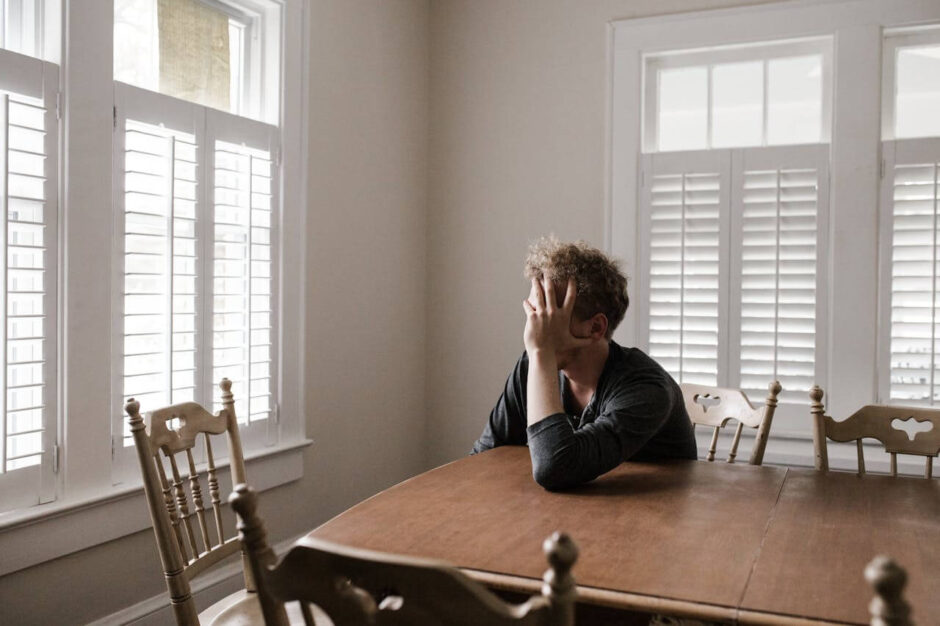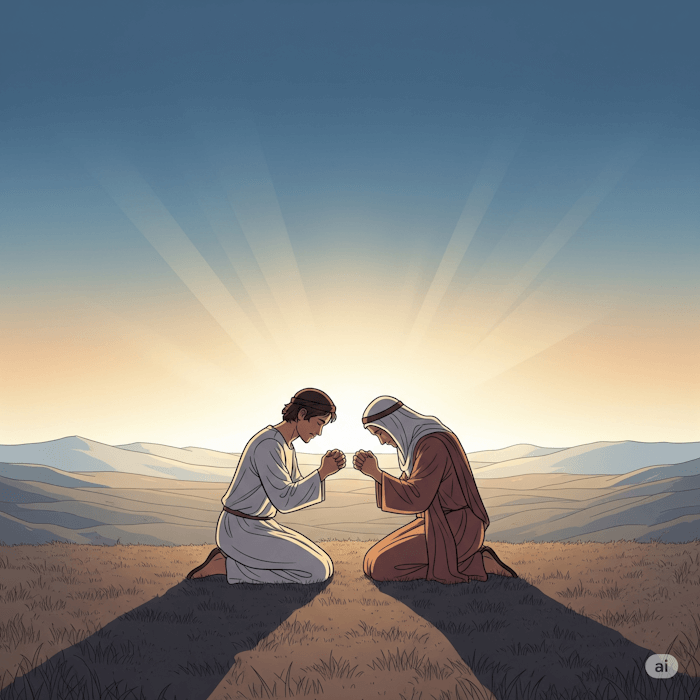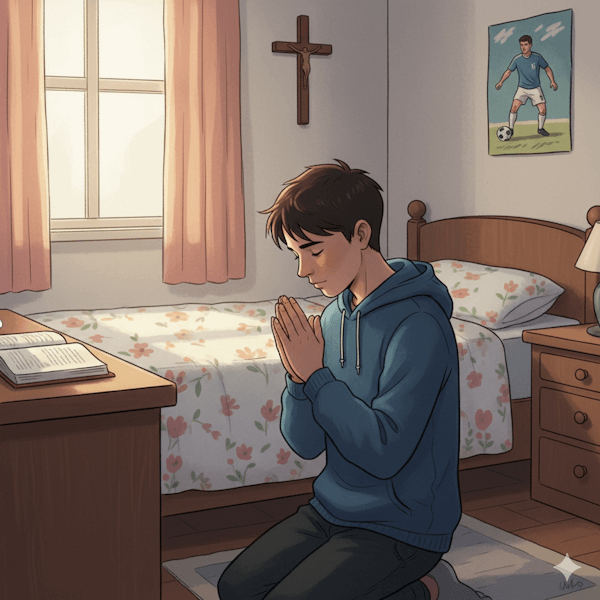Anxiety manifests as an inner storm of worries and fears, especially in a world that glorifies agitation. It is a deeply human experience, but for the Christian, the answer is not in the absence of problems, but in the presence of a God greater than any storm.
The Bible does not ignore this pain; on the contrary, it offers a remedy: the peace of God, which exceeds all understanding and serves as a firm anchor for the soul.
This devotional plan Five Days is a practical guide to plunging into the Word, realigning our perspective and adopting spiritual practices to find that lasting peace.
Let’s start.
Day 1: The Peace Principle – Delivering Control to God
The root of much of our anxiety lies in an illusion: that we are in control.
We carry the burden of managing every detail of our lives, finances, relationships and future, as if the success or failure of everything depended solely on our strength and wisdom.
Anxiety is the sound that our soul makes when we try to occupy the throne that belongs only to God.
The first step in finding peace, therefore, is not trying to control the storm, but to hand over the rudder of the boat to the one who created it.

Bible Reading: Philippians 4:6-7
Do not be anxious about anything, but in everything, by prayer and supplications, and with thanksgiving, present your requests to God. And the peace of God, which surpasses all understanding, will guard your hearts and your minds in Christ Jesus.
Philippians 4:6,7 (NIV)
Reflection:
This passage is one of the most powerful in the Bible about anxiety. Paul does not give us a suggestion, but a kind commandment: ‘Do not be anxious.’
But he doesn’t stop there. He gives us the divine alternative: prayer.
Notice the progression:
- prayer, conversation with God;
- supplication, specific requests;
- Thanksgiving, recognition of what he has already done and who he is.
Prayer is not just a wish list; It is an act of transference.
As we pray, we are saying, ‘God, this problem is too big for me. I can’t control it. I put it in your capable and sovereign hands.’
The promise that follows is extraordinary. God’s peace will not necessarily come when the problem is solved, but during the delivery process.
And this peace acts like a soldier, a sentry that will ‘keep’ our hearts (our emotions) and our minds (our thoughts) from the attack of anxiety. Peace becomes our front line.
Practical application:
Our practical application goes through 3 simple steps:
- the ‘Inventory of Anxiety’;
- the prayer of surrender;
- gratitude.
The ‘Inventory of Anxiety’
Take a sheet of paper or open a document and specifically list everything that is causing you anxiety today. Don’t be generic.
Instead of ‘money’, write ‘the electricity bill that expires Friday’. Instead of ‘family’, write ‘the difficult conversation I need to have with my son’.
The Delivery Prayer
Now, go through each item on the list in prayer. For each one, say it out loud:
‘Dad, I give you my anxiety about[item específico]. I recognize that I don’t have control over it, but I trust you. Please take the lead in this situation.’
Gratitude
After delivering each item, end your prayer by thanking God for three specific things in your life that have nothing to do with your current problems. This changes the focus of your mind from what you already have in it.
Day 2: The Anchor of Peace – Focusing on God’s Truth
Anxiety thrives in an environment of uncertainty and speculation.
Our mind creates catastrophic scenarios, the famous ‘What if…?’. ‘What if I lose my job?’, ‘What if I get sick?’, ‘What if my son deviates?’
These thoughts are like winds that destabilize us. The only way to find stability is to anchor ourselves in something that does not change: the truth of the Word of God.
Peace is not the absence of questions, but trust in the answers that God has already given us.

Bible Reading: Isaiah 26:3
Thou shalt keep in perfect peace the one whose purpose is steadfast, because in you trusts.
Isaiah 26:3 (NIV)
Reflection:
The Hebrew word for ‘peace’ here is shalom, which means much more than the absence of conflict. It means completeness, well-being, safety and health. And God’s promise is that He will keep us in this state of perfect shalom. But there is one condition: let our mind be ‘firm’ in it.
The word ‘firm’ here means ‘supported’, ‘sustained’. Imagine someone leaning against a solid wall during an earthquake. The wall is the truth of God; We are the person who chooses to lean on it. Anxiety wants our minds to lean on problems, news, opinions of others.
God invites us to support our minds in His promises and His character. When our mind is established in the truth that He is good, sovereign, faithful and is with us, peace becomes the natural consequence of that trust.
Practical application:
Our practical application goes through 3 simple steps:
- the ‘arsenal of truth’;
- meditation and memorization;
- Transform your thoughts.
Create your ‘Arsenal of Truth’
Identify the main lies that your anxiety usually tells you (ex: ‘You will fail’, ‘God has abandoned you’, ‘There is no hope’).
Now, use a Bible search tool, such as an app or website, and find 2 to 3 verses that directly contradict each of these lies. For example, for ‘God forsaken you,’ find Deuteronomy 31:8 or Hebrews 13:5.
meditation and memorization
Choose one of these verses to be your ‘anchor’ of the day. write it in a post it And stick it in a visible place (bathroom mirror, computer screen). Repeat it aloud several times throughout the day. Meditating is not emptying the mind, but filling it with the truth of God until it becomes more real than our fears.
Transform your thoughts
Whenever an anxious thought arises today, stop and confront it consciously with its ‘anchor’ verse. say:
‘Mind, this anxious thought is not the truth. The truth is what the Word of God says:[recite seu versículo]’.
Day 3: The Foundation of Peace – Resting in Divine Sovereignty
Excessive concern for the future is one of the biggest sources of anxiety. We try to plan, predict and protect ourselves from all eventualities, an impossible burden to carry.
Jesus offers us a radically different path: rest in sovereignty and in the provident care of God.
If he takes care of the birds of the sky and the lilies of the countryside with such attention, how much more will he take care of us, his children?

Bible Reading: Matthew 6:25-27, 33-34
²⁵ ‘Therefore I say to you, do not worry about your own lives, about what to eat or drink; nor with your own bodies, as to what to wear. Is life not more important than food, and the body more important than clothing?
²⁶ Look at the birds of the sky: they do not sow or reap or store in barns; However, Heavenly Father feeds them. Don’t you have much more value than they are? ²⁷ Who of you, no matter how much you care, can add an hour to your life?
[…]
³³ Seek therefore first the kingdom of God and His righteousness, and all these things will be added to them. ³⁴ So don’t worry about tomorrow, for tomorrow will worry about yourself. It’s enough every day its own evil.’
Matthew 6:25-27, 33-34 (NIV)
Reflection:
Jesus does not invalidate our needs. He recognizes them, but calls us to reorder our priorities. The logic of anxiety is: ‘I need to solve all my needs and then perhaps seek God.’
The logic of the kingdom is: ‘Seek God first, and trust that He will take care of all your needs.’
Anxiety steals our energy from the present to spend it in a future we cannot control. Jesus’ instruction is a powerful antidote: ‘It is enough every day for your own evil.’ He invites us to live in the watertight compartment of ‘today’.
God gives us grace, strength and bread for today. Grace for tomorrow, He will give us tomorrow. Trying to live tomorrow’s worries with today’s grace is a sure recipe for exhaustion and anxiety.
Resting in God’s sovereignty is to trust that He is already in our tomorrow, preparing the way.
Practical application:
Our practical application goes through 3 simple steps:
- the exercise of nature;
- Delimit the ‘today’;
- Practice the ‘First Kingdom’.
the exercise of nature
If possible, spend 5 minutes today watching the nature around you. A bird, a flower in the garden, the clouds in the sky.
Reflect on God’s order and care for these elements that are not concerned. Use this observation as a visual sermon from God to you about your care.
Delimit the ‘today’
Take your list of tasks and worries. Only circle the things you can and need to do today. For all the others (which belong to tomorrow, next week, next month), say a conscious prayer:
‘God, I entrust you with these future concerns. Help me to focus and be faithful only with what the Lord has put in front of me for today.’
Practice the ‘First Kingdom’
Before diving into the tasks and worries of the day, dedicate the first 15 minutes of your morning to seek God. Read the Bible before reading the messages from the Whatsapp.
Pray before looking at social media. Starting the day with the Kingdom first lays the foundation for a day of peace.
Day 4: The Fuel of Peace – The Power of Gratitude
Anxiety and gratitude cannot occupy the same mental space at the same time. Anxiety focuses on what can go wrong, what is missing, what it threatens.
Gratitude, on the other hand, forces our minds to focus on what we already have, what is good, what is a blessing.
It is a spiritual discipline that acts as a powerful antidepressant to the soul, realigning our hearts with the goodness of God, even in the midst of difficult circumstances.

Bible Reading: 1 Thessalonians 5:16-18
Always rejoice. Pray continuously. Give thanks in all circumstances, for this is the will of God for you in Christ Jesus.
1 Thessalonians 5:16-18 (NIV)
Reflection:
We need to pay attention to what the text says and what it doesn’t say. He doesn’t say to give thanks for all things, as if we had to thank you for an illness or a loss. He tells us to give thanks in all things.
This means that, regardless of the external circumstance, we can always find a reason to be grateful, because our gratitude is not based on the situation, but on the immutable character of God and His presence with us.
Gratitude is a declaration of faith. is to say:
‘God, even if I don’t understand this situation, even if it’s painful, I choose to thank you because I know you’re in control, I know that you love me and I know that you can even use that for my good and for your glory.’
Practicing gratitude is not denying pain; It’s choosing to focus on the provider instead of the problem.
Practical application:
Our practical application goes through 3 simple steps:
- the ‘Diary of Gratitude’;
- ‘Alarms of Gratitude’;
- Express gratitude to someone.
The ‘Diary of Gratitude’
Commit yourself today to starting a gratitude diary. Before going to sleep, write five specific things you are grateful for that day.
Challenge yourself not to repeat the same items for a week. Be detailed: instead of ‘for my family’, write ‘for the hug I received from my son today’.
‘Alarms of Gratitude’
Set up two or three alarms on your phone for today. When an alarm rings, stop what you are doing for 60 seconds and simply thank God for something around you at that very moment: the sun in the window, the chair you are sitting on, the technology that allows your work.
Express gratitude to someone
Gratitude grows when it is shared. Send a message today, email or make a call to someone, thanking you specifically for how that person impacted your life. This will not only bless the other person, but will also fill your own heart with joy and peace.
Day 5: The Community of Peace – Carrying the burdens together
Anxiety loves isolation. She whispers us that no one would understand, that we would be a burden, that we are the only ones to feel that way.
This is one of your biggest lies. God created us for the community.
We were designed to share life, celebrate the joys and carry each other’s burdens.
Allowing others to enter our struggle is not a sign of weakness, but an act of wisdom and humility that opens the door to healing and peace.

Bible Reading: Galatians 6:2
Take the heavy burdens of each other and thus fulfill the law of Christ.
Galatians 6:2 (NIV)
Reflection:
The Greek word for ‘loads’ here is barē, which refers to a heavy, crushing burden, something that we were not made to carry alone – just how chronic anxiety can feel.
The ‘law of Christ’ is the law of love. Therefore, loving one another in practice means entering the life of the other and saying, ‘Let me help you carry it.’
This works in two ways. We need humility to admit that we need help and courage to share our struggle with a trusted brother or sister.
And we also need love to be that shoulder friend to others, listening without judging and praying with fervor.
Often, when we help someone to carry their burden, we find that our own becomes lighter. The Community of Faith is the ecosystem that God designed for peace to flourish.
Practical application:
Our practical application goes through 3 simple steps:
- Identify your ‘circle of trust’;
- Take the first step;
- Be an intercessor.
Identify your ‘Circle of Trust’
Think of one or two people in your life (a close friend, a small group leader, a pastor) who have demonstrated spiritual maturity and are trustworthy. Pray for the courage to share with one of them what you are facing.
take the first step
Send a simple message today to one of these people, saying, ‘Hello, I’ve been facing some anxious fights lately. Would you have time to talk and pray together this week?’ Being vulnerable is the first step in receiving community support.
be an intercessor
Think of someone in your life who may be going through a difficult situation. Send a message to that person, not to offer advice, but simply to say, ‘I’m thinking and praying for you today. Know that you’re not alone’.
Offering peace is one of the best ways to try it out.
Conclusion: Finding peace amid anxiety
At the end of these five days, the storm outside may not have stopped completely. The waves of life will continue to come. But, we hope, something inside you has changed.
The practice of handing over control, focusing on the truth, resting on sovereignty, cultivating gratitude and living in a community builds a breakwater around your heart.
the peace of God It is not a final destination, but a reliable daily walk. Keep practicing these principles.
Some days will be easier, others more difficult. But in each of them, the Father’s hand is extended, inviting you to hold it and find, in it, the peace that exceeds any and all understanding.
May he himself, the Lord of peace, give you peace, always and in every way. The Lord be with you all.
‘God of Peace’, a sermon by Charles Spurgeon
For your final meditation, listen to this mighty Charles Spurgeon’s Sermon about the true and lasting peace that only God can offer.
Play and be blessed!
- Aroer – 10 de October de 2025
- Aijalom of Zebulun – 10 de October de 2025
- Aijalom of Dan – 10 de October de 2025